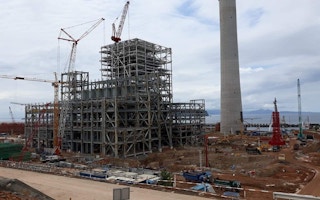The Philippine government will no longer approve applications for the new construction of coal-fired power plants, the country’s energy chief Alfonso Cusi announced on Tuesday (27 October).
To continue reading, subscribe to Eco‑Business.
There's something for everyone. We offer a range of subscription plans.
- Access our stories and receive our Insights Weekly newsletter with the free EB Member plan.
- Unlock unlimited access to our content and archive with EB Circle.
- Publish your content with EB Premium.
The moratorium is based on a recent review of the country’s energy requirements, which sought a “resilient and flexible” power mix amid the Covid-19 pandemic, Cusi, the Philippines’ energy secretary, said at a conference that was part the 13th Singapore International Energy Week.
“While we have initially embraced a technology-neutral policy, our periodic assesment of our country’s energy requirements is paving the way for innovative adaptations in our policy directions,” he said in a pre-recorded speech. “We are also pushing for the transition from oil-based technology utilisation to cleaner energy sources, which includes liquified natural gas, to ensure more sustainable growth for the country.”
The Philippines is projected to have the highest share of coal in the power mix for the region in 2030, and Tuesday’s announcement may choke off about 10 gigawatts (GW) of coal in the pipeline, shaping “a future where all Filipinos are given access to clean and affordable energy”, said Gerry Arances, executive director of non-government research institute Center for Energy, Ecology and Development (CEED).
The new policy is expected to affect the plans of the country’s largest conglomerate San Miguel Corporation, whose subsidiaries have 3.6 GW of coal power in the pipeline. But its president and chief operating officer Ramon Ang told news outlet Philstar that the company would abide by the rules. Ayala Corporation’s AC Energy said it was supportive of the new directions, while Aboitiz Power said the new policy would not affect its long-term plans, Philstar reported.
Arances urged the government to phase out the 9.8 GW of coal currently installed in the country and cancel the four GW of committed coal projects, as the department’s new policy does not cover applications that have already been endorsed or have secured the needed permits.
Coal—the single biggest source of global warming— is estimated to account for 52.3 per cent of the annual 396.9 million metric tonnes of carbon dioxide emitted by the country in 2030, according to the Philippine Energy Plan.
Although Cusi took more than a year to follow up on president Rodrigo Duterte’s marching order to cut the country’s dependence on coal, Arances said he is “thrilled” with the announcement. In 2019, Cusi thumbed down a ban of new coal projects until the country attained energy security.
Lidy Nacpil, coordinator of the Asian Peoples’ Movement on Debt and Development (APMDD), was sceptical about the policy declaration, calling it “temporary”.
“[A moratorium] can be revoked or lifted anytime. So this new coal moratorium is effective only until the next baseload capacity additions are needed,” Nacpil said. Baseload power refers to power sources that meet the country’s minimum electricity demand.
Sara Ahmed, energy finance analyst of the Institute for Energy Economics and Financial Analysis (IEEFA), welcomed the development, citing how “outdated technologies should no longer be used”.
“This is a clear policy signal to modernise our power sector and also for imported coal plants to take a backseat, and rightfully so, amidst lower-cost domestic options for renewables,” Ahmed told Eco-Business.
“It’s clear that the department of energy is pushing for cost-competitiveness to deliver lower prices to consumers and industry and more domestic energy security.”
Cusi’s announcement comes amid the department’s push for the use of nuclear power to solve precarious supply and soaring electricity costs in one of the fastest-growing economies in the region.
Relaxed foreign ownership for geothermal projects, but at what cost?
He also announced that the Philippines will be allowing 100 per cent foreign ownership in geothermal energy projects worth US$50 million or more, through Financial and Technical Assistance Agreements (FTAAs).
FTAAs could be entered into between foreign contractors and the Philippine government for the large-scale exploration, development, and utilisation of natural resources, and are signed by the president.
But the legal basis of an FTAA on geothermal projects must be further studied as there is no provision for this under the Renewable Energy Act of 2008, warned Arances, who is also the former national coordinator of the Philippine Movement for Climate Justice.
“FTAAs, in our experience, have always been skewed to the interest of foreign entities like how it has been for mining,” he said. “It goes with a lot of incentives for foreign entities. It is as if we do not have at the very least capable local corporations.”










